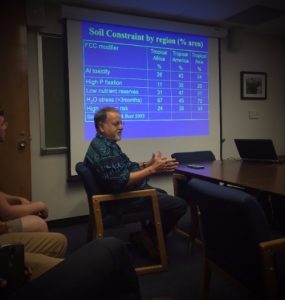Dr. Pedro Sanchez lectured on “Soil Management in Africa” at the latest Natural Resource Management in Africa Working Group meeting on September 14, 2017. Dr. Sanchez is a research professor in the Soil and Water Sciences Department at University of Florida, focusing specifically on tropical soils throughout his career. His research on soil management has allowed him to collaborate on projects attempting to reduce world hunger—including working with the Millennium Villages project, Millennium Development Goals, and the African Green Revolution. His lecture broadly discussed soil management in Africa and how this can impact agricultural productivity. Most soils in Africa are alfisols. There is a misconception that African soils are rendered infertile due to high erodibility or chemical and mineral imbalances, however Dr. Sanchez notes that even naturally infertile soils can be managed to be fertile.
In 2004, the UN Millennium Project announced the need to improve soil in Africa for increased food security. Dr. Sanchez worked through this project on the Hunger Task Force to achieve these goals. Since the establishment of the Hunger Task Force in 2004, there has been better governance, private sector involvement in soil management, the creation of the Alliance for a Green Revolution in Africa (AGRA), and greater collaboration between science and policy. One of the goals of the project was to increase cereal production in Africa from 1 ton/ha to eventually reach 10 ton/ha similar to the levels of cereal production seen in the U.S. To accomplish this goal, Dr. Sanchez argues that there should be improvements to seed and fertilizers used in African agriculture. However, he notes that this is a “two leg job” and only improving seed or fertilizers will not achieve positive results.
In his lecture, Dr. Sanchez said variability in soil quality is higher within small farms; often soils closer to households are more fertile than soil in fields farther from the home. This kind of knowledge can inform farmers on how they will fertilize their land more effectively. Dr. Sanchez is attempting to address this problem through the creation of SoilDoc, a lab in a box that allows farmers to analyze soil in the field. Although SoilDoc is still in development, Dr. Sanchez hopes that data collected from this project will be able to be sent to a cloud-based system to inform planners of soil trends in small-scale African farms. Other trends that Dr. Sanchez believes will improve food security in Africa include the establishment of private extension services, the spread of agrodealers, increased use of cereal banks, a focus on high value products, and the participation of youth in agricultural business ventures.